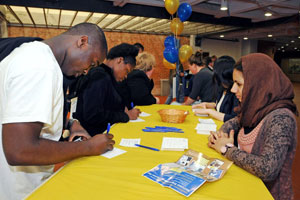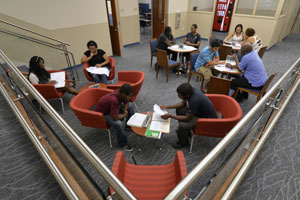Interview Tips for Success
Congratulations! All of your job search effort has paid off and you have landed your first interview.
Be Prepared
- Appropriate professional dress and personal grooming are of major importance. The current trend is smart casual clothing (a more modern look between formal and business casual). Smart casual allows more personality to show while remaining professional. The links below give advice and examples of what to wear by gender.
Interview attire for men
Interview attire for women
Virtual Interviewing
- Check your technology ahead of time and consider the lighting and space for appearance
- Make eye contact by looking at the camera
- Select a quiet space to avoid distractions
- Prepare and practice for the interview just like you would an in-person interview
https://www.indeed.com/career-advice/interviewing/virtual-interview
Practice, Practice, Practice…And Its Benefits-
- Your responses to common interview questions (see following pages for examples)
- Research the company’s website for their history and mission and be able to communicate what you have learned
- Being able to answer the typical interview questions quickly and thoughtfully
- It is common to feel nervous…practicing will help you feel more mentally prepared; Be aware that each interview and style can be different, so flexibility is key!
- Thinking ahead of examples of what you are most proud of achieving will make it easier when it is time to interview. This allows the interviewer to get to know you and see you in the role
Interview Time…Create a Positive First Impression-
- Be yourself- Bring your resume and cover letter to life!
- Greet the interviewer(s) with a smile and introduction; Engage in small talk with a common topic before the interview begins
- Be confident in knowing that you have been asked to interview because it is believed that you are qualified for the role, they want to speak with you to learn more about you and to see if you will be a good fit for the team and organization.
- The interview is a time to assess your personality, work ethic, communication and problem-solving skills
- Be aware of non-verbal behavior as well…making eye contact, posture (sitting up straight with slight forward lean demonstrates interest), arms relaxed by your side and feet apart facing forward, avoid talking with hands and movement in general
- Understand that each interview will be based on the style of the interviewer and number of participants and as a result will vary. Some interviews may be a question and answer format and others may be more conversational.
- It is ok to ask to have a question repeated or have a moment to put your thoughts together to answer
- Ask for business cards so that you can send a thank you email following the interview
Commonly Asked Interview Questions
There are two types of questions commonly asked during an interview…traditional and Behavioral-Based. Your goal should be to answer each type with a good description highlighting your skills and accomplishments in a thorough and well thought out style that allows you to promote yourself and your experiences while relating to the interviewer(s). The traditional interview questions and how to best answer them are on the next page.
The behavioral-based type of question is considered an open-ended question. The best way to respond to the question is to use the STAR Method. STAR stands for Situation, Task, Action and Result. The question will focus on a typical situation commonly experienced at work. The best response will be the telling of a story and explain the situation, how you addressed it, the skills you used to resolve it and lastly the resulting positive outcome. All four parts are important!
- For behavioral-based interview questions specific to job title visit:
- To watch a video on how to successfully answer a behavioral-based interview question visit:
There are questions that employers are not legally allowed to ask, such as your age, relationship and family status, religious/political affiliation etc., but they are asked anyway. Avoid providing personal information in your responses and focus on the purpose of the conversation.
It is best to be forthcoming about past situations that did not end favorably or if you have legal background issues. Acknowledge the situation and what you have learned as a result.
Traditional Interview Questions
- Tell me why you applied for this position.
• Be able to have a firm answer regarding how your experience/training seemed like a good match for the job description - What do you know about our company?
• Let the employer know that you did your homework by responding with the research that you did on the organization - What are your main strengths?
• Choose the characteristics about yourself which have helped you to succeed and which apply to the position you are interviewing for - What is your biggest weakness?
• Choose a characteristic of your professional life which you have already improved. For instance: “I discovered that my time management skills needed improvement, so I decided to plan my agenda well in advance in order to avoid any scheduling conflicts.” - What particular skills can you bring to our organization?
• This is the perfect “sell-yourself” question. Tell a story to show how you have used the skill and a positive outcome resulted - Why did you leave your last position?
• Stress your desire for professional growth - What elements of your last job caused you the most pressure? How did you handle the pressure?
• Always choose an incident in which you succeeded; Make sure to give a complete answer to the two part question - Tell me about a team project in which you participated either in school or at work?
• This is a behavioral type question where the STAR Method should be used to give the best answer; Tell the story from beginning to end and highlight your skills and participation in the event - Describe your former supervisor’s management style. OR: What did you like most and least about your former supervisor’s management style?
• Careful! Stick to general information and always begin on a positive note such as, “My supervisor continually kept the lines of communication open in our department, which I greatly appreciated. He did have a bit of a temper at times, but I quickly came to realize that his behavior was nothing more than a stress relief method.” - What are your career goals?
• Here the employer wants to know that you have given careful thought to your chosen profession and that you also have a certain amount of ambition. - Why are there gaps in your employment history?
• Gaps in your job history make an employer concerned about your reliability. If this situation applies to you, you’ll need to demonstrate how you have used the gap time productively. - Why did you choose this particular career/field of study?
• Here an employer is looking to discover your level of interest in your area of expertise. It is best to discuss your interest of the subject matter in terms of personal fulfillment rather than personal gain. - What was the most challenging part of your last position?
• If you are a recent graduate, you may address this question from an academic level by telling the interviewer about the challenges of your study and research. If you held a part-time job throughout college which posed challenges, you may discuss those as well. If you are an experienced job seeker, the interviewer is primarily concerned with your most recent experiences with creative problem solving. - Why have you changed jobs so frequently?
• Dependability is the issue here, and “I needed to find myself” is not a productive answer. Temporary jobs, layoffs/reorganizations and retraining are really the only acceptable answers for this question. - Why have you decided to change careers?
• Sometimes employers can be suspicious of people who have spent a significant amount of time in one industry and then decide to change their career entirely. Never indicate that you are suffering from “burnout” from a former job or career. Rather, give an honest and brief assessment of your former industry and then stress your desire of bringing your skills into a new employment arena. - What are your salary requirements?
• It is highly important that you know the market value of both the job and the level for which you are applying. Be realistic. If you have some experience in a particular field, then your “going price” would be the mid-to-upper starting range. If you do not have related experience, then you should expect to start at the lower end of the range. One Internet site which gives salary information is Salary Wizard: http://www.salary.com. - If hired for this position, when would you be able to start?
• If you are currently working, it is perfectly realistic to be able to give that employer two weeks’ notice. Beware of the company that frowns upon this professional courtesy! Chances are that such an organization would not extend many courtesies to their own employees. - Why should we hire you?
• This catch-all question provides the perfect opportunity for you to summarize your strengths and how you can meet the employer’s needs.
“Do You Have Any Questions?”
It is typical for the interviewer to ask this at the end of the question and answer period. Your response will indicate to the interviewer how interested you are in the position. It is best to ask questions which are appropriate to the job or to the company in general. Do not ask questions regarding compensation and/or benefits. It is the employer’s responsibility to bring up this topic when you become a serious contender for the job. Here are some sample questions which demonstrate your enthusiasm for the position.
- What are the most important skills required for this position?
- On what basis do you judge success in this position?
- What are some of the long range and short term objectives for this position?
- What type of training does your company offer?
- What direction do you see your organization taking? OR: What are your company’s plans for future growth?
- What are the prospects for advancement within the organization?
- Is there anything more that I can tell you regarding my background and qualifications for the position?
- When will you be making a hiring decision?
ALSO: This would be a good time to clarify any questions you had concerning the nature of the job or the duties of the position.
NOTE: It is perfectly acceptable to make a follow-up phone call to check your status if you have not heard from the organization within the given timeframe.
At the end of the interview, the interviewer should discuss the timeframe for the hiring decision and the next step in the hiring process. As stated in the last section, it is perfectly acceptable to inquire about this toward the end of the interview. In any case, it is important that you, as the job candidate, to have a firm idea of what to expect next. Do not be surprised if the hiring process requires one or even two call-backs, even for an entry-level position. Bear in mind that companies today are extremely cautious before extending a job offer. Lastly, before exiting the interview, be certain to shake hands with the interviewer, say that you enjoyed the opportunity, and thank the interviewer for his/her time.
After The Interview-Always Communicate With The Employer
- Send a short thank you email/note to each interviewer separately to restate your interest, skills and appreciation for the interviewer’s time.
- Accept their employment offer or turn it down professionally
- Learn from the experience













